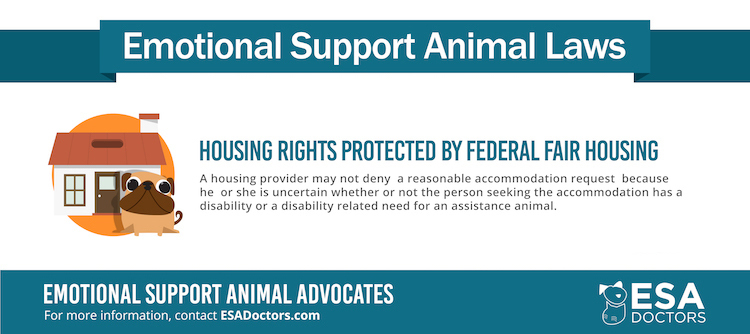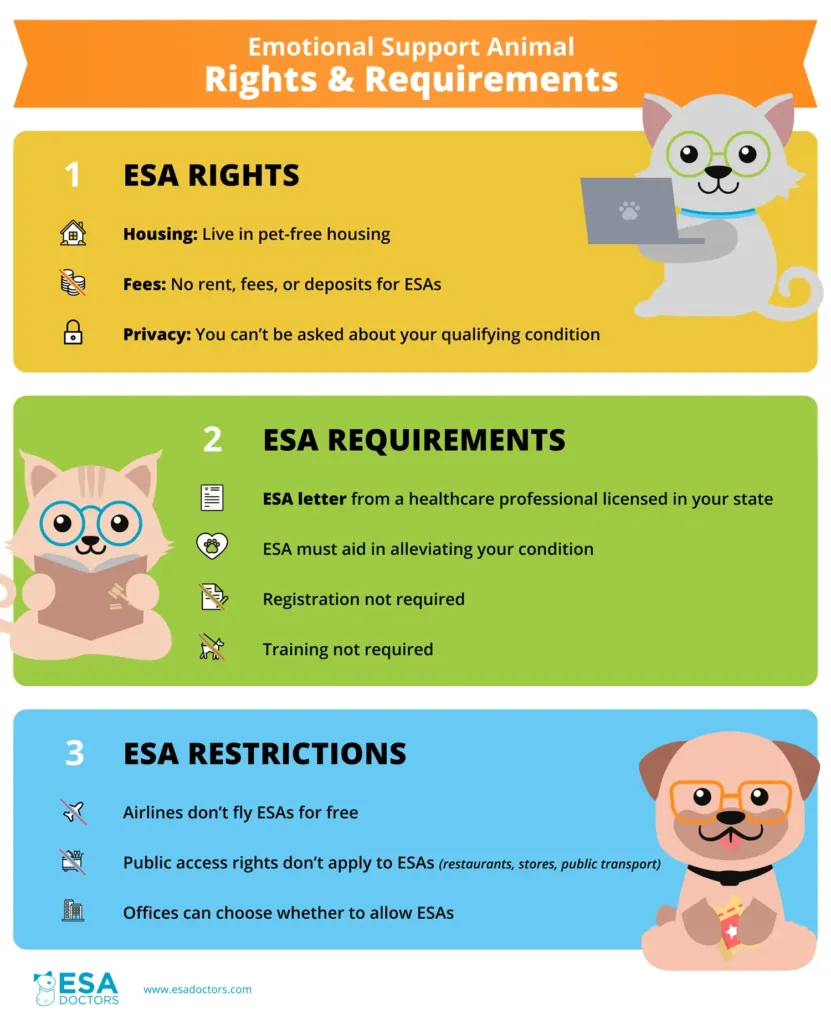Federal and state laws protect your right to have an emotional support animal in your home. Our ESA rules experts have reviewed them so you can get answers to all of your ESA-related questions about housing in no-pet buildings and whether you can travel with an ESA on a plane or bring them to a restaurant.
In this article, we explain what these laws are and how they protect you and your emotional support animal.
Emotional Support Animal Owners Are Protected by Federal Laws
There are three major federal laws that deal with assistance animals, but only one is really important for you to know if you have an emotional support animal. These laws are known as the Fair Housing Act (FHA), the Air Carrier Access Act (ACAA), and the Americans with Disabilities Act (ADA).
What is the Fair Housing Act?
Under the federal Fair Housing Act, landlords must accommodate tenants who own emotional support animals, even if the building has a policy that prohibits pets. This applies to all 50 states. The US Department of Housing (HUD) issues guidance on how the provisions of the FHA are implemented and enforces Fair Housing rules.
What is the Air Carrier Access Act?
As a result of new DOT rules for emotional support animals that came out in 2021, ESAs in the U.S. are no longer given special consideration on flights; they are treated as normal pets.
Psychiatric service dogs, however, are still protected under the Air Carrier Access Act, and all airlines must allow passengers with PSDs (and other types of service dogs) to fly in the cabin free of charge.
What is the Americans with Disabilities Act?
The Americans with Disabilities Act (ADA) specifically protects service dogs — dogs that are trained to perform tasks that help with disabilities. Think of a dog that guides someone with vision impairment through city streets or provides deep pressure therapy to someone having a panic attack. These dogs can go pretty much anywhere their handler goes – stores, restaurants, movie theaters — because they’re essential for their handler’s daily functioning.
ESAs work differently. While they provide real emotional comfort and support, they’re not covered by the ADA. This means that, unlike service dogs, they can’t automatically come with you into public spaces. Your ESA has solid rights under housing law to live with you, but they won’t be able to join you for dinner at a restaurant or shopping at the mall unless that business happens to welcome pets.

Click here to get started on qualifying for your ESA letter
Emotional Support Animal Housing Law
The FHA’s rules for emotional support animals were designed so that housing providers can’t discriminate against a person for needing an emotional support animal.
Under Fair Housing rules, ESAs are recognized as a type of assistance animal that is needed by a person with a mental health condition that significantly impairs life activities, such as depression, anxiety, or PTSD. ESAs are exempt from normal pet rules like those that prohibit dogs or restrict an animal’s size or breed type.
HUD is the government agency that oversees the FHA and investigates discrimination complaints against housing providers. HUD releases guidance on how landlords and tenants should comply with Fair Housing rules relating to ESAs. The most recent guidance was issued in January 2020.
The Fair Housing Act applies to most types of housing in every state, including rentals, co-ops, and condominiums. Some smaller landlords don’t have to comply with ESA rules: owner-occupied buildings with no more than four units and single-family homes sold or rented by the owner without the use of an agent.
To legally protect your pet as an emotional support animal, you need to get an ESA letter from a mental health professional licensed for your state. A valid ESA letter from a licensed professional is the only way to qualify for an emotional support animal under the FHA.
Under Federal Fair Housing Rules, an ESA is not considered a normal pet. Therefore, a building’s policies regarding pets do not apply to an ESA.
Rights of Emotional Support Animal Owners under ESA Housing Rules
Under the Fair Housing Act, ESA owners have the following rights:
- Exemption from no-pet policies and lease provisions
- Freedom from pet fees and deposits
- Exemption from breed restrictions
- Exemption from size and weight limits
- Right to privacy regarding specific details about health

Under HUD guidance, housing providers must consider a tenant’s ESA request and respond promptly. Housing providers are permitted to ask for documented proof from the tenant, which comes in the form of an ESA letter from a licensed healthcare professional.
HUD requires landlords to work in good faith with tenants. That means if the landlord has an objection to the emotional support animal, they should work cooperatively with the tenant to find a solution that allows the tenant to keep their ESA. Housing providers that fail to fulfill their obligations under the Fair Housing Act when it comes to ESA requests and unfairly discriminate against ESA owners face potential action from HUD and civil liability. There are limited exceptions that a landlord can use to deny a tenant’s emotional support animal.
Emotional Support Animal State Laws
Many states have their own emotional support animal laws. These laws are usually very similar to federal law and add an extra layer of protection. For example, New York and Florida have state-specific rules for emotional support animals.
Some states have rules that have different requirements from the federal regulations that you should be aware of. For example, California changed its rules in 2022 to have a 30-day waiting period to get an ESA letter if you are seeing a therapist or doctor for the first time.
Emotional Support Animal Qualification Requirements
Your pet may functionally already act as your ESA, but your pet isn’t legally your ESA until you get an ESA letter. A licensed therapist, doctor, or social worker can recommend an ESA if they believe one would help you with a mental illness or emotional disability.
An ESA recommendation letter:
- states that you suffer from a mental or emotional disability and that the ESA is necessary to alleviate symptoms of your disability;
- states the type of animal(s) you have;
- is written by a licensed healthcare professional;
- must be signed and dated by the provider; and
- must include the LMHP’s license and contact information so the housing provider can verify the letter.
Your pet is not recognized as an ESA in the eyes of the law until you obtain an ESA letter.
ESA laws also protect the privacy of an ESA owner. Landlords are not allowed to request specific details regarding your health condition and cannot ask for your medical records or order a medical examination. As an ESA owner, you have a right to protect sensitive and confidential information regarding your health.

Qualifying for an ESA Letter
If you’re having trouble finding a licensed healthcare professional, ESA Doctors can help connect you to a friendly and experienced professional who is licensed for your state.
These licensed professionals can help assess whether an emotional support animal is right for you and, if you qualify, can write an ESA letter that you can confidently submit to your landlord.





I was already living in my apartment that had recently changed to a no pet policy when I was approved for an ESA and plan to adopt a cat for that purpose. The building manager submitted my paperwork to the corporate office 2 months ago every time I follow up she makes excuses about why they have not responded yet and recently said they could still say no when and if they did respond. I did not think they were allowed to say no so I was suspicious the delay was some kind of loop hole to prevent an appeal. I looked up more information on ESA regulations and found this article with the 10 day response time limit. Does this mean thy are already in violation of the HUD guidelines? What other steps can I take to get them to approve my ESA?
Under HUD guidelines landlords are expected to respond to an ESA request promptly, and guidelines indicate that is within 10 days. 2 months is an unacceptably long time. We suggest following up with your landlord and letting them know they owe you a response.
Do I need to provide vet records for an esa?
HUD guidelines are silent regarding vet records, but landlords often request them to ensure the animal is properly vaccinated and in good health.
How are esa animals protected if they attack and injure someone?
If an ESA attacks or injures someone, they are NOT protected. If an ESA behaves in that way a landlord has the power to evict the emotional support animal.
I rente a single family house. We rent directly from our landlord. Can I have an ESA?
If the home was sold or rented by the owner without the use of an agent, they may be exempt from HUD’s ESA rules.
Can a trucking company prohibit me from having my registered emotional support animal in my work truck while I drive over the road?
Unfortunately emotional support animals do not have workplace or public access rights. ESAs primarily have rights when it comes to housing. In addition, to qualify for an ESA you will need an ESA letter – registration by itself will not suffice.
Can an apartment complex tell you where your surpport dog can go to the bathroom
An apartment complex cannot dictate the terms of when an ESA is allowed to relieve itself. That would be a highly unusual demand.
I’m having this issue right now. I live in an apartment complex with lots of grass areas and I’m being told that my ESA is not allowed on the grass- AT ALL. Essentially, I can’t walk around outside with my ESA. I wouldn’t be able to walk (and feel safe) without him.
If the grass is a common area where other tenants are allowed to tread, then ESAs would also generally be allowed in that common public space.
I am raising two of my grandsons. One of them is 12 years old and has ADHD and in the last year he has developed a lot of an anxiety. How can I see if he qualifies forESA? On here to fill out the questionnaire it says you must be over 18 years of age he is
Unfortunately the LMHPS we work with can only assist adults.
Can a college refuse an ESA based only on the weight of my dog if it doesn’t pose a direct threat and is eligible otherwise?
Housing providers cannot deny an ESA solely because it is a certain weight. Please see this article for more details: https://esadoctors.com/emotional-support-animal-college-dorms/
I have a married couple that has a emotional support animal that is aggressive. The wife stated she cannot control the dog only her husband because the dog is his emotional support animal. Is this true or not? I thought both adults are supposed to have control of the emotional support animal due to if the husband wasn’t at home and there’s children involved.
An ESA cannot be aggressive or out of control. Any ESA that threatens the health or safety of other tenants can be denied accommodation by landlords.
My Housing provider told me my Emotional Support Animal cannot live in my apartment until after they approve it. Is this true? I live in Massachusetts and can’t find any information on this
Housing providers are given time to approve an ESA. They should respond to your request within 10 days. You may find this post helpful: https://esadoctors.com/hud-housing-rules-emotional-support-animals/
I’m homeless and my dog is emotional support dog and I have him registered, I got help for a hotel room but the manager here says he’s not under the act section 4 , do I have a right not to pay 50 bucks a night. I’m the only one who he trusts and if he goes somewhere else to stay till I get on my feet again, I’m afraid he’s not going to make it. He’s been through so much, we both have and what happens if I have a panic attack?
We’re sorry to hear about the tough situation you’re in. Unfortunately hotels are not required to accommodate emotional support animals. We suggest getting in touch with a homeless advocacy organization – they often have experience with homeless people who own animals. We hope you find the help you need.
I was asked to not bring my pet to my next doctor’s aopt. Isn’t this against the law? She is an ESA pet. They used the excuse of others might be allergic and that she must be a service animal. She is providing a service.
ESAs do not have broad public access rights like service dogs. They only have rights for housing.